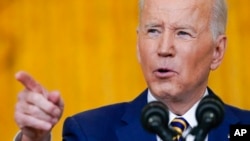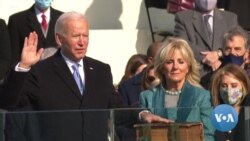During his first press conference of the year, U.S. President Joe Biden spoke candidly at the White House on Wednesday about the possibility of a Russian invasion in Ukraine.
"My guess is he will move in — he has to do something," Biden said of Russian President Vladimir Putin. He warned that such an invasion would be met with the harshest measures. "He has never seen sanctions like the ones I promise will be imposed if he moves,” Biden said.
“What I'm concerned about is this could get out of hand,” he said on the potential confrontation between Moscow and NATO countries bordering Ukraine.
In an interview with VOA earlier Wednesday, Secretary of State Antony Blinken emphasized the administration’s message.
“We've equally made clear that if Russia chooses to renew its aggression against Ukraine, we — and not just we, the United States, we, many countries, throughout Europe, and even some beyond — will respond very forcefully and resolutely,” Blinken said in Kyiv, where he met with Ukrainian leaders.
But some analysts said Biden has ceded too much ground to Putin.
“For all his talk about these being unprecedented sanctions, we have yet to see sanctions change the Kremlin's calculus,” Brett Bruen told VOA. Bruen was director of global engagement during the Obama administration and is president of the consulting firm Global Situation Room.
Biden stressed the importance of managing the brewing conflict that stems from Russia’s displeasure that Ukraine, a former Soviet country, may someday join NATO.
But Bruen said the president spoke too openly about doubts and divisions within the NATO alliance.
“This is really unfortunate and only helps Russia,” he added.
Biden repeated that he did not think Putin had made up his mind about invading Ukraine, and he continued to offer a diplomatic path out.
“I am hoping that Vladimir Putin understands that short of a full-blown nuclear war, he is not in a very good position to dominate the world,” he said.
On Iran, Biden said his administration planned to continue diplomatic talks in Vienna to try to revive the Iran nuclear deal.
“It’s not time to give up,” he said, arguing that progress was being made. For months, the Biden administration has tried to reach a deal with Iran after former President Donald Trump in 2018 withdrew from the 2015 agreement to curb Tehran’s nuclear weapons program.
On China, Biden said he did not believe this was the right time to lift tariffs on Chinese goods that were placed during the Trump administration.
First anniversary
On the eve of his first anniversary in office, Biden took questions for almost two hours, mostly on domestic concerns, including inflation that is dragging economic recovery, and confusion on the latest health protocols to combat the COVID-19 pandemic. It was his first news conference of 2022 and the ninth since he came into office.
Biden was defiant in the face of journalists grilling him on whether he overpromised on his campaign pledge to control the pandemic and rebuild the American economy.
“I didn’t overpromise. But I have probably outperformed what anybody thought would happen,” Biden said. “You'd have to acknowledge we’ve made enormous progress.”
Before the press conference, Mitch McConnell, the top Republican in the Senate, released a statement lambasting Biden’s record.
“Since President Biden was sworn in a year ago, he’s presided over the worst inflation in four decades and record-breaking increases in crime, failed to shut down COVID or handle the crisis at the southern border, and ordered a calamitous and shameful withdrawal from Afghanistan,” the statement said.
Biden pledged to continue to take steps to get the pandemic under control and acknowledged the frustration many Americans say they are feeling.
"Should we have done more testing earlier? Yes. But we're doing more now," he said, outlining his administration’s efforts to make free COVID-19 tests more widely available.
Biden acknowledged that he might not be able to pass Build Back Better, his $1.9 trillion signature social safety net and climate change plan that is stuck in the Senate, in its current form.
“I think we can break the package up, get as much as we can now, come back and fight for the rest later,” he said.
Biden pointed to obstructionism from the Republican Party on why progress has been limited.
“I did not anticipate that there'd be such a stalwart effort to make sure that the most important thing was that President Biden didn't get anything done,” he said.
In his remarks before taking questions, Biden urged the U.S. Federal Reserve to take action to address inflation. Consumer prices jumped 7% in December compared with a year earlier, the highest inflation rate in 40 years. It has dampened economic recovery in a year that the administration says has shown the biggest job growth in American history.
Meanwhile, former President Donald Trump released his own statement, complaining about what he called preferential treatment by the press.
“How come Biden picks a reporter off a list, in all cases softball questions, and then reads the answer? I would never have been allowed to get away with that, nor would I have to!” Trump said.
Low poll numbers
Biden’s sunny demeanor belies the fact that his standing in voter opinion surveys has steadily fallen since the chaotic withdrawal of U.S. forces from Afghanistan last September.
Less than half of Americans approve of Biden, according to the latest Reuters/Ipsos poll. The national poll, conducted January 12-13, found that 45% of U.S. adults approved of Biden’s performance in office. Biden’s approval numbers have hovered below 50% since August.
“Generally speaking, the mood in the country is tough,” Mallory Newall, vice president of public affairs at Ipsos, told VOA, pointing to recent polls that suggest Americans’ behavior of bunkering at home is translating into dissatisfaction into other areas.
“The collective mood is one of questioning and frustration,” Newall said. “And I think that does spill over into issues related to the economy, getting back to work, curbing inflation, dealing with other domestic policies.” This is particularly the case when getting a grip on the pandemic was the number one issue that Biden campaigned on, she added.
Some analysts said Biden performed well during his question-and-answer session with the press.
“He showed stamina, he showed commitment, he showed energy. No one can argue he's wasting away or that he's ill-informed about what is going on,” said Jeremi Suri, a professor of history and public affairs at the University of Texas at Austin.
Suri told VOA that Biden showed how deeply committed he is to his legislative agenda.
“I think he moved the needle, at least persuading people that this is an agenda of his that he's not going to abandon,” Suri added. “He did not, however, provide a clear pathway for how he's going to go forward with it.”
Anita Powell and Myroslava Gongadze contributed to this report.









